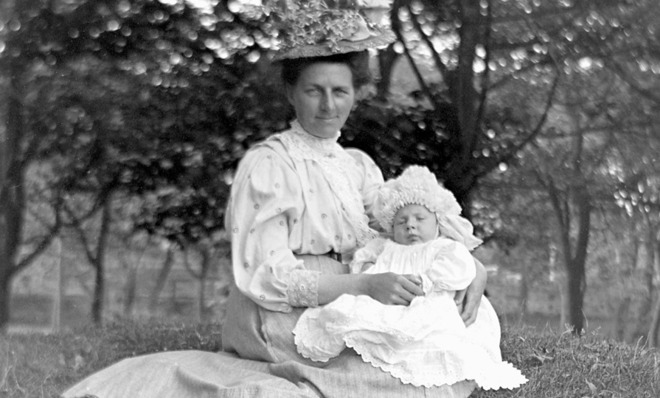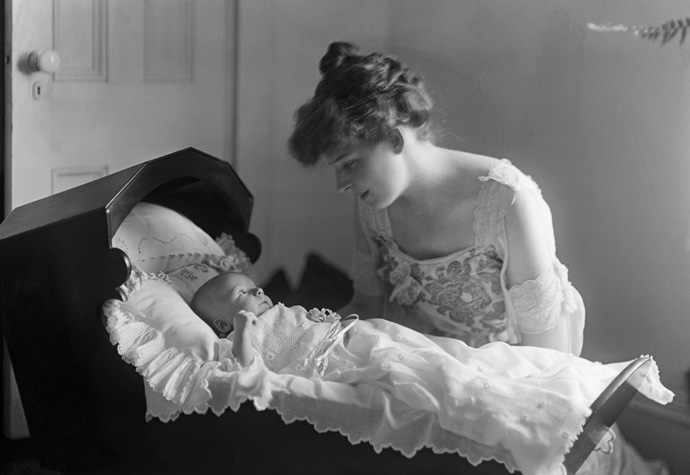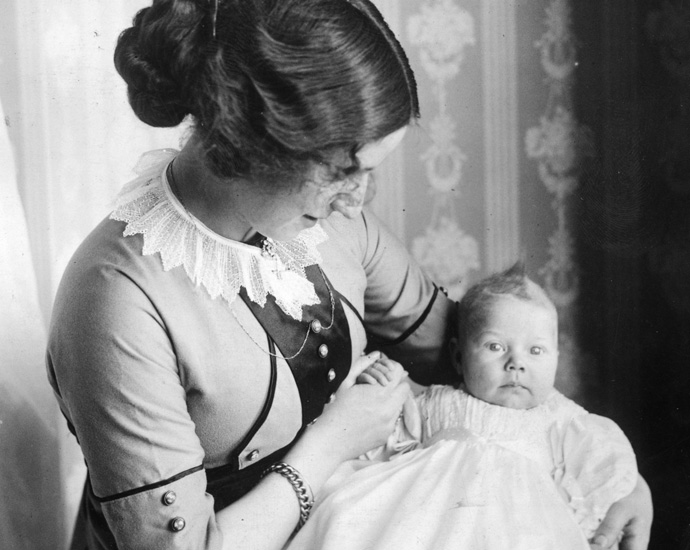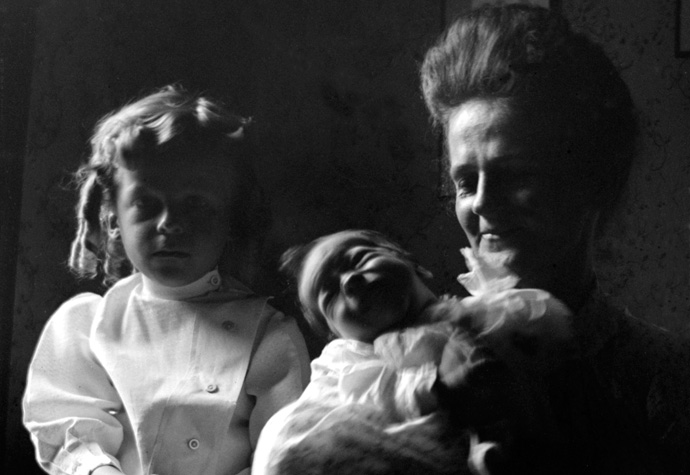What to expect when you're expecting (100 years ago)
Whatever you do, don't feed your voracious appetite


A free daily email with the biggest news stories of the day – and the best features from TheWeek.com
You are now subscribed
Your newsletter sign-up was successful
A lot of tragedy could befall a woman in the 19th century. Untold diseases, wars, and hardship could tear the spirit right out of a woman.
But no tragedy was as great as failing to become pregnant. Just ask John Kellogg, the avante garde physician and proprietor of the famous Battle Creek Sanatorium. He wrote a whole book in 1884, Ladies' Guide in Health and Disease, to help shepherd women through the trials of pregnancy. The first step, of course, was to remove women's selfish fears about dying (childbirth being the top cause of death for women in the late 19th century).
We hope to offer in these pages suggestions which will afford to such wives assurance of safety and so great a mitigation of suffering as will lead them to choose the slight inconveniences of normal pregnancy and physiological childbirth rather than the dismal comfort of a childless old age and the increased liability to disease, which is likely to result from a childless life. [Ladies' Guide in Health and Disease, John Kellogg]
B.G. Jefferis, in his popular Searchlights on Health: The Science of Eugenics (1920) gets even more to the point. Childless people are deplorable.
The Week
Escape your echo chamber. Get the facts behind the news, plus analysis from multiple perspectives.

Sign up for The Week's Free Newsletters
From our morning news briefing to a weekly Good News Newsletter, get the best of The Week delivered directly to your inbox.
From our morning news briefing to a weekly Good News Newsletter, get the best of The Week delivered directly to your inbox.
What is more deplorable and pitiable than an old couple childless? Young people dislike the care and confinement of children and prefer society and social entertainments and thereby do great injustice and injury to their health. Having children under proper circumstances never ruins the health and happiness of any woman. In fact, womanhood is incomplete without them. She may have a dozen or more, and still have better health than before marriage. [Searchlights on Health: The Science of Eugenics, B.G. Jefferis]
If you think pregnancy and potentially dying in childbirth is rough, try the horrible stigma of incomplete womanhood. Women were put here for a purpose, darling, and it ain't self-actualization through personal growth.

Symptoms of pregnancy
First you get impregnated with your little germ-baby, as according to John D. West's Maidenhood and Motherhood, or, Ten Phases of Woman's Life (1887):
The two (egg and sperm) will coalesce and together constitute the germ of a new being. This vitalized germ lodges somewhere in the sexual organs of the female, ordinarily the womb, and from that time begins a new and independent growth. The germ is thereafter termed the fetus. [Maidenhood and Motherhood, or, Ten Phases of Woman's Life, John D. West]
1. Ceasing to be unwell
A free daily email with the biggest news stories of the day – and the best features from TheWeek.com
There were no plastic pregnancy tests 130 years ago; there weren't even accurate tests a doctor could administer to find out if you were pregnant. Add to that the fact that the poor nutrition and exhaustion faced by many woman of the age could make missing a period quite a common thing.
Women were therefore advised to look for multiple signs to show they were pregnant. The first sign, usually, would be that she would "cease to be un-well." Or as West phrases it, "the failure of the menses, or the return of her monthly sickness."
2. Gross skin
More from West on signs of pregnancy:
The peculiar, rose-colored circle around the nipple enlarges in size, and gradually assumes a darker hue, and becomes covered with numberless pimple-like elevations... Oft times, the skin becomes loose and wrinkled, giving the young and beautiful wife the appearance of an old, haggard, care-worn woman. In some instances, a considerable growth of hair will develop on those parts of the face which in men are covered with beard. Women who ordinarily perspire readily and freely now have a dry, rough skin, while those whose skin is naturally dry and rough, perspire excessively and emit an odor that is sometimes quite offensive." [West]
3. The onset of a depraved appetite
A depraved appetite is another of the common symptoms... The woman eats enormously, for her, and still is always hungry. This craving will sometimes compel her to get up at midnight to eat. She may desire only certain kinds of food, or, perhaps, drink. If she refuses to satisfy this craving for particular kinds of food, the thought of it will haunt her day and night. [West]
While many doctors of the day advised giving into those cravings, Dr. John Kellogg believes yielding to them is a sign of weakness.
The craving which pregnant women often experience for various articles of food cannot be regarded as an expression of a real want upon the part of the system... In the majority of cases the craving is not so strong that it cannot be readily controlled by a little determination on the part of the prospective mother, and when the article craved is manifestly an improper one, the will should be set actively at work to resist the morbid appetite. [Kellogg]
West disagrees. A woman's depraved appetite should be satisfied, less the fetus pay the price.
The unsatisfied craving may show itself, as in birth-marks upon the child. It is advisable, therefore, as far as may be without injury, to satisfy all such cravings. [West]
Take, for example, the "hankering for gin" case Jefferis puts forward.
A certain mother while pregnant longed for gin, which could not be gotten; and her child cried incessantly for six weeks till gin was given it, which it eagerly clutched and drank with ravenous greediness, stopped crying and became healthy. [Jefferis]
See? All your baby needed was a stiff belt of gin. And if the expectant mother could have had open access to the stuff throughout the pregnancy, the whole issue could have been avoided.
4. Hysteria
Finally, general hysteria bordering on insanity is a pretty reliable indicator of pregnancy.
Other affections of the nervous system are sometimes developed of a hysterical nature. The wife will have depressing forebodings of impending evil; she feels that some great calamity is about to befall herself or some of her family. At other times, she is incredulous of her own condition. She will often invent the most ingenious arguments to convince herself and others that all her peculiar symptoms are attributable to any cause but pregnancy. A peculiar kind of insanity is sometimes developed, and it may become so serious as to require some sort of restraint put upon the wife's actions. [West]
Forcible restraint to combat temporary insanity was an example of the "slight inconveniences" a woman might need to cope with on her journey to motherhood.

Selecting the gender of your choice
Despite the gaps in medical knowledge in the 1800s, there was one thing all doctors could tell you. It's very simple to pre-select the gender of your child. It's all in the timing. Early eggs are immature and become female. Later eggs are strong enough to become male. Jefferis explains:
The Agricultural Theory, as it may be called, because [it was] adopted by farmers, is that impregnation occurring within four days of the close of the female monthlies produces a girl, because the ovum is yet immature; but that when it occurs after the fourth day from its close, gives a boy, because this egg is now mature; whereas after about the eighth day this egg dissolves and passes off, so that impregnation is thereby rendered impossible, till just before the mother's next monthly. [Jefferis]
There are other potential methods to ensure the birth of either a son or daughter, as desired. Elisabeth Robinson Scovil lists some in her 1896 book, Preparation for Motherhood:
Another theory is, that if the father is physically the stronger, more capable of impressing his personality, a daughter will be born; otherwise, a son. It is also said, that if the mother at the time of conception is excited, interested and anxious to bear a son, she is likely to attain her desire. The age of the parents is supposed to influence the result. If the father is much older than the mother, it is considered probable that daughters will predominate in the family. [Preparation for Motherhood, Elisabeth Robinson Scovil]
Thus, if you desire a son, you need to be a large, anxious, older woman who has intercourse no earlier than five days after your period. Otherwise, which gender you conceive might be pretty random.
Once conceived, a doctor who is skilled in the use of a new tool, "the stethoscope," can make determine your child's sex by listening to the telltale heartbeats of the fetus. West explains:
Some physicians who are well-skilled in the use of the stethoscope and possessed of sufficient keenness of ear to distinguish a difference in faint sounds, can determine the sex of the child in the later months of pregnancy. It is by noting the pulsations of the foetal heart. There is sufficient difference to allow a detection, though it requires careful observation. If the pulsations exceed 130, the child will certainly be a girl; if under that number, it will be a boy. [West]
What to avoid during conception
Understand that a child is a creature of spirit, and is therefore affected even before the sexual act takes place between its mother and father. There are situations to strictly avoid when trying to conceive.
Says Jefferis:
To obtain the best results, conception should take place only when both parties are in the best physical condition. If either parent is in any way indisposed at the time of conception the results will be seen in the health of the child. Many children brought in the world with diseases or other infirmities stamped upon their feeble frames show the indiscretion and ignorance of parents. [Jefferis]
Hay fever? No sex. Too much pie for dinner? No sex. Pimple outbreak? Oh, you better believe, no sex. And if you make love while at all intoxicated, prepare for the worst. From Dr. Kellogg:
The special influence of the mother begins with the moment of conception. In fact it is possible that the mental condition at the time of the generative act has much to do with determining the character of the child, though it is generally conceded that at this time the influence of the father is greater than that of the mother. Any number of instances have occurred in which a drunken father has impressed upon his child the condition of his nervous system to such a degree as to render permanent in the child the staggering gait and maudlin manner which in his own case was a transient condition induced by the poisonous influence of alcohol. A child born as the result of a union in which both parents were in a state of beastly intoxication was idiotic. [Kellogg]
Alcohol has produced millions of children since the first bits of barley water accidently fermented 5,000 years ago. Think of where the human race would be if that were not the case.

Shocked, sober mother begets drunk baby
Now, we sit back and let Mr. West tell a tale of great import. It is crucial that a pregnant woman be insulated in a pleasant, healthy, and wholesome environment for the whole of gestation. Otherwise, the repercussions could be devastating.
Anatomical peculiarities upon the body of the child are often produced by mental impressions received on the mind of the mother during pregnancy. This is denied by some physiologists, who maintain that such defects, marks or deformities are more the result of inheritance. Careful observation, however, leads to the conclusion that many such phenomena are due to forces that have their origin in the mind, life and habits of the mother while her child is developing within her womb.
A well-authenticated case illustrates the point in hand in a horribly clear and pointed manner. It comes from a small town in New Jersey, where a child was born having all the symptoms of intoxication. The physicians explain that there is no evidence of catalepsy, that there are no fits, no convulsions in the case, whatever. But there seems to be no co-ordination in the movements of the lower limbs. The child's gait is heavy and insecure — a regular drunken reel or stagger. The speech is not only thick, incoherent and rambling, but has all the phenomena of exhilaration and excitement characteristic of the earlier stages of intoxication. The ideas seem to flow rapidly, the senses are acute, but there are the muscular tremblings and the actual shambling gait of the drunkard.
This abnormal condition is thus explained, and satisfactorily: The mother had been married but a year, and she and her husband were greatly attached to each other. She believed him to be temperate; indeed, never had a thought to the contrary. She was compelled to pass a grog-shop on her way, and as she came to it she heard a voice that was strangely like her husband's, singing a ribald song. She was so struck with astonishment that she involuntarily looked in at the door, not to verify, but to remove the unpleasant suspicions which the familiar voice created. There she beheld her husband in a state of hilarious intoxication. This was but a few weeks before the birth of her child. It was a boy, and seemed physically perfect and well-formed. He soon developed the peculiarities noted, which he will no doubt carry with him through life. It is one of the most singular cases on record, and can be accounted for on no other hypothesis than that the impression of horror made on the mother's mind was conveyed to the fetus within her womb. [West]
There it is. Impressions made on the mind of the pregnant mother are transmitted directly to the physical form, even the soul, of the child. But as Jefferis points out, such impressions can be positive, too:
A woman rode side by side with her soldier husband and witnessed the drilling of troops for battle. The scene inspired her with a deep longing to see a battle and share in the excitement of the conquerors. This was but a few months before her boy was born, and his name was Napoleon. [Jefferis]
Napoleon. Wow. I did not see that coming.
Sex in pregnancy
You really shouldn't need to be told this, but in case you are of a particularly base nature and need reminding, sexual congress during pregnancy is a bad idea. It will make your child grow up to be a pervert, for one thing.
Sexual indulgence during pregnancy may be suspended with decided benefit to both mother and child. The injurious influences upon the child of the gratification of the passions during the period when its character is being formed, is undoubtedly much greater than is usually supposed. We have no doubt that this is a common cause of the transmission of libidinous tendencies to the child. [Kellogg]
It would also increase the discomfort and illness suffered by the mother. Even dogs know that.
Morning Sickness is the most common and is the result of an irritation in the womb, caused by some derangement, and it is greatly irritated by the habit of indulging in sexual gratification during pregnancy. If people would imitate the lower animals and reserve the vital forces of the mother for the benefit of her unborn child, it would be a great boon to humanity. [Jefferis]
This is but a portion of the advice doctors doled out to help women produce a healthy, morally sound child in their womb. Luckily, most of the rest of it kind of made sense.
(Photos courtesy of Getty Images and Corbis Images)
Therese O'Neill lives in Oregon and writes for The Atlantic, Mental Floss, Jezebel, and more. She is the author of New York Times bestseller Unmentionable: The Victorian Ladies Guide to Sex, Marriage and Manners. Meet her at writerthereseoneill.com.
-
 What to know before filing your own taxes for the first time
What to know before filing your own taxes for the first timethe explainer Tackle this financial milestone with confidence
-
 The biggest box office flops of the 21st century
The biggest box office flops of the 21st centuryin depth Unnecessary remakes and turgid, expensive CGI-fests highlight this list of these most notorious box-office losers
-
 The 10 most infamous abductions in modern history
The 10 most infamous abductions in modern historyin depth The taking of Savannah Guthrie’s mother, Nancy, is the latest in a long string of high-profile kidnappings
